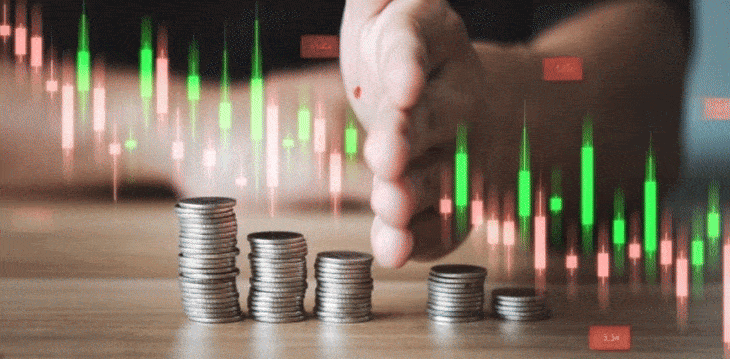The Forex market is a place where you can get a lot of trading opportunities and benefits. However, these opportunities and benefits do not automatically as they rely on several factors, including inflation. Inflation is a market state that impacts a region’s currency utility and the forex platform itself.
As the forex market operation mainly involves purchasing and selling a currency to one another, it is dependent on the currency merit movement and this is why traders must know inflation and it can influence the currency value for making an informed decision.
Currently, we will be going through the subject of inflation and how it can impact the forex trading decisions.
How Do You Define Inflation?
The term ‘inflation’ indicates the uprising value in the products’ price in the economic state gradually, which leads to a reduction in the currency buying value. Also, you will notice central banks regulate a standard inflation level to promote economic expansion because an increase in the inflation and deflation rate can influence the economy negatively.
Inflation is also observable in CFD trading alongside the forex market, in these financial markets, inflation refers to as a crucial economic indicator to measure its health and can make a direct impact on the currency value.
If there is an inflation uprising in a region, the region’s currency value will decrease, and contrary, when there is a reduction in the inflation rate, the economic currency value will become stable.

The Link Between Exchange Rates And Inflation
Let’s say you are a forex trader and operating on the MetaTrader 4 platform, the most impactful way you can notice the influence in the forex trading decisions is through the exchange rates.
The exchange rates indicate a currency’s merit over the other one and vary depending on several factors such as:
1. Increasing Inflation And Currency Devaluation
If you observe an increasing Inflation rate in a country, it indicates a reduction in the currency value. This scenario occurs because the product’s rate becomes very costly which in turn decreases its appeal in the international markets. And if the scenario becomes the opposite, the product value will also reduce and will face deflation in other currency values.
Traders who can anticipate this scenario properly will sell the currency in a region with a high inflation rate and purchase the currency of a region with a low inflation rate. You can refer to the following situation as a currency’s devaluation which is regarded as an opportunity for traders to generate profits.
2. Reduced Inflation And Currency Appreciation
The opposite case of high inflation suggests more stability in the currency value of a country. The reduced inflation rate regulates a currency’s buying authority which will make it more appealing to international investors.
If you observe that inflation is maintained properly, international investors will be more likely to saturate in the country’s products which can increase the currency’s demand itself. If the currency’s appeal is heightened, the value appreciation to several currencies will also rise.
Forex traders mainly look for similar scenarios to buy the currency of a certain region with a low inflation rate for which they evaluate that the value will also increase in the upcoming days.
Inflation Influence on Monetary Procedure
When it comes to monetary policy, the central banks have a huge contribution, especially in regulating the inflation rate. If the banks notice the inflation rate exceeding a certain level, they implement certain measures to regulate it like expanding the interest rates.
However, when the inflation has a low rate or devaluation forces are there, the central bank will reduce the inflation rate to encourage economic expansion. For instance, here are a few examples:
1. Inflation Alongside Interest Rates
Interest rates and inflation are more closely related than you think, central banks implement interest rates to impact the inflation rate. As we have suggested earlier if there is high inflation, central banks will expand the interest rates to turn borrowing more costly and decrease the customer disburses which in return, reduce the inflationary strains.
Forex traders need to closely comprehend the link between the inflation and interest rates. A higher interest rate will have a robust currency value as a high amount of investors are enticed to higher bends. For this, forex traders are more likely to purchase assets of a country with high interest rates because there might be currency appreciation.
2. Central Bank Activities And Forex Trading Resolutions
If you are a forex trader, you need to firmly observe central banks policies and activities alongside the inflation announcements to measure the interest rate and monetary policy fluctuations. For instance, when a region’s central bank increases its interest rates to respond to the inflation rates.
Due to this occurrence, the currency value might also increase which in turn, can prompt forex traders to purchase the currency. Alternatively, when central banks decrease the interest rate, following a reduced inflation or devaluation, the currency value might reduce which can prompt traders to sell the currency.

Inflation, Forex Sentiment, And Economic Expansion
You can also connect inflation to inclusive economic conditions and its extent can notably impact the forex market sentiment. However, high inflation can also trigger economic expansion that can decrease the customers’ buying capacity and weaken a business’s beneficialness.
In similar situations, traders might recognize a country’s currency as less appealing which can lead to paying off the certain currency in the forex platform. Conversely, a reduced inflation rate suggests a balanced and healthful economic condition which can result in a positive overview of that region’s currency.
If you experience an economic expansion with a low inflation rate, it might call for international investments that can lead to an increase in currency demand. This is why, several forex traders are attracted to currencies with hefty economic expansion chances and low inflation rates.
Inflation, Suppositions Alongside Tentative Trading
Suppositions regarding the upcoming inflation carry a crucial aspect in the forex platform dynamics. Forex traders sometimes purchase or sell currencies that are dependent on expected inflation drifts instead of recent inflation rates.
Tentative trading is generally guided by predictions and discernment regarding inflation’s advancement in the upcoming days alongside the central bank’s actions on the monetary policy. For instance, if forex traders speculate a high inflation in a region, they might assume that the central will increase the internet rate to restrain the inflation rate.
The following occurrence can tempt forex traders to purchase the currency with a probable expectation of an increasing rate. Alternatively, when traders anticipate low inflation, they might forecast that the central bank will decrease the interest rate which can result in a weakened currency value.

In Conclusion
You can undoubtedly mark that inflation is a critical moving factor when it comes to the forex market determination. We also mentioned several crucial factors that impact inflation such as the central bank policies, especially the interest rate, economic growth, market sentiment, and other factors that traders must observe to generate profits. You can also rely on online trading for the following scenarios.
You can come across many trading facilities but our FXcess platform is an exception. Fxcess is a place where you can achieve your trading goals with suitable trading assets and tools. Nonetheless, we also offer affordable brokers and affiliated programs that can speed up your trading progress. Our FXCess is a stoppage where you can get most of the facilities you are looking for in one place.
FAQs
1. How can inflation impact the forex market?
– Inflation can impact the forex market by incapacitating a currency value which can result in exchange rate movements and this factor can be responsible for both profits and risks for the forex market traders. Some of the aspects that can be impacted are trade balance, investment, and many more.
2. Can inflation impact trading?
– Yes, inflation can impact trading activities in several aspects that consist of stock values, exchange rates, market unpredictability, and many more.
3. What happens to a trader during inflation occurrence?
– A trader can be affected during inflation because of the risk and benefit factors. Descriptively, here are some instances such as incorporating profits, investor confidence, growth margins, and other factors.
4. What happens to the forex market during an uprising interest rate moment?
– During the period of uprising interest rate, you will notice currency value appreciation in the forex market.
Disclaimer:
This information is not considered as investment advice or an investment recommendation, but instead a marketing communication. FXCess is not responsible for any data or information provided by third parties referenced, or hyperlinked, in this communication